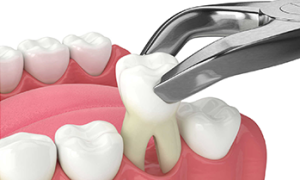Tooth extraction may sound intimidating, but in some cases, it’s the best option to maintain oral health. Dentists always try to save natural teeth whenever possible, but when a tooth is damaged or causing complications, removal may be necessary. Let’s explore some common reasons for tooth extraction and when it becomes the best course of action.


- Severe Tooth Decay
When a tooth is extensively decayed, and a filling or root canal cannot save it, extraction may be necessary to prevent infection from spreading to nearby teeth and gums.
- Advanced Gum Disease
Gum disease (periodontitis) can weaken the bone structure supporting the teeth. If a tooth becomes loose due to bone loss, extraction may be required to prevent further complications.
- Impacted Wisdom Teeth
Wisdom teeth often don’t have enough space to grow properly, leading to impaction, pain, infection, or misalignment of other teeth. Removing impacted wisdom teeth helps prevent future dental issues.
- Overcrowding and Orthodontic Treatment
In some cases, teeth need to be extracted to create space for orthodontic treatments like braces. This helps in properly aligning the remaining teeth for a healthy bite.
- Trauma or Injury
Accidents or sports injuries can cause teeth to crack or break beyond repair. When a damaged tooth cannot be restored, extraction is necessary to prevent pain and infection.
- Infection or Abscess
If a tooth infection reaches the root and antibiotics or a root canal cannot control it, removal may be the best solution to prevent it from spreading to other areas.
- Extra Teeth (Supernumerary Teeth)
Some people develop extra teeth that block normal teeth from coming in properly. Extraction helps prevent crowding and misalignment.
When Is Tooth Extraction Necessary?
A dentist will recommend extraction only when:
✔ The tooth is beyond repair with fillings, crowns, or root canals.
✔ It’s causing severe pain or affecting surrounding teeth.
✔ Infection is spreading, posing a risk to overall health.
✔ It interferes with orthodontic treatment or bite alignment.
What to Expect After Tooth Extraction
After the procedure, you may experience mild discomfort and swelling, which usually subsides in a few days. Following your dentist’s aftercare instructions, such as avoiding hard foods and maintaining good oral hygiene, ensures smooth healing.
Final Thoughts
While tooth extraction is sometimes unavoidable, maintaining good oral hygiene and regular dental checkups can help prevent situations that lead to removal. If you’re experiencing persistent tooth pain or dental issues, consult your dentist to determine the best treatment plan.


